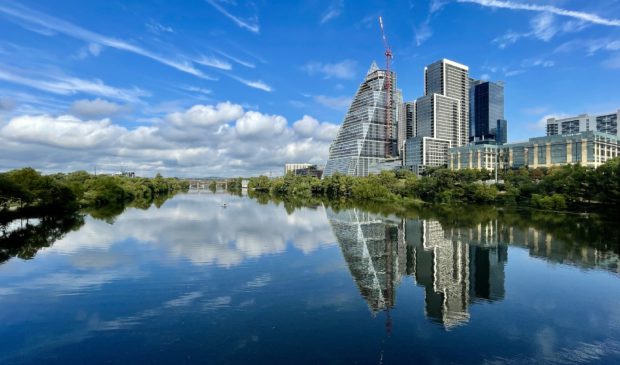Wednesday, November 24, 2021 by
Chad Swiatecki Driven by strong job growth, in-migration and the ongoing supply of federal stimulus funds, the Austin area is experiencing a “growth surge” that economists expect to continue for the foreseeable future.
That was the main message at a recent economic forecast presentation organized by the Austin Chamber, where the vital statistics of the national and Central Texas economies were reviewed to determine overall performance coming out of the Covid-19 pandemic.
Economist Jon Hockenyos said all sectors of the Austin economy have strongly rebounded, with 79,000 jobs added in the past 12 months. Local gross domestic product results are above pre-pandemic levels and wages are growing at just under 5 percent.
He said with the area’s vaccination rate now over 70 percent, even entertainment and hospitality businesses are seeing strong demand.
“Whether it’s you at the nail salon, at the hotel or a performing arts center, that’s the last stuff to come back,” he said. “But as I look around the room we’re all comfortable being here together and we’re starting to get more comfortable with going out, and we see that since it’s hard to get a reservation in Austin these days. It’s almost impossible.”
While inflation approaching 6 percent nationally is a concern that is expected to linger into the second half of 2022, Hockenyos said the biggest check on local growth is the cost of housing. Recent data shows the area has less than one month’s demand for housing available, far below the recommended supply of six months, with median single-family home prices now at $539,000.
Those home price increases are abated somewhat by the growth in wages, with the average weekly wage in the area growing to $1,663.
Hockenyos said labor shortages are an issue mostly in retail businesses, with the strength of the local economy and labor needs making irrelevant the pre-pandemic push for a $15/hour minimum wage for some city contracts.
At this point in Austin more than anywhere else supply issues are the constraints on growth, be it housing or the labor force. All over town in consumer-facing areas people are looking for workers. “The new effective minimum wage in Austin is at least $15 an hour, maybe more,” he said.
“That’s interesting from a public policy perspective because a couple of years ago the city was trying to mandate $15 an hour as a minimum requirement for a number of economic development deals, and that’s no longer an issue since the number now is probably closer to $18 to get somebody to stick around.”
While the local commercial real estate market is experiencing ongoing demand softness because of the move by many companies to remote work, warehousing and industrial real estate are hotter than ever. That’s in part because of the endorsement Tesla has given the area with its multibillion-dollar gigafactory in East Austin. The recent announcement that Samsung is locating its $17 billion manufacturing facility in nearby Taylor only adds to the area’s strength.
“One of the nice things about Tesla is they’ve sent a message out there for advanced manufacturing firms to come on in, the water is fine in Austin,” Hockenyos said. “We used to think that Austin was going to be too pricey for that kind of activity but that turns out to not be the case. They may not locate in Central Austin and instead go somewhere else in the region, but there are lots of people in the space now looking at Austin because Tesla is such an important company.”
The Austin Monitor’s work is made possible by donations from the community. Though our reporting covers donors from time to time, we are careful to keep business and editorial efforts separate while maintaining transparency. A complete list of donors is available here, and our code of ethics is explained here.
Do you like this story?
There are so many important stories we don’t get to write. As a nonprofit journalism source, every contributed dollar helps us provide you more coverage. Do your part by donating to the nonprofit that funds the Monitor.






















